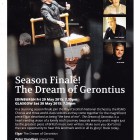Dream of Gerontius 2015Royal Scottish National Orchestra
Read more about the opera Dream of Gerontius
Operatic appearances by these soloists have been very rare in Scotland, and they are kept busy visiting the world's great opera houses. Nor is the RSNO's current musical director yet known for his operatic work. Once again, therefore we feel we can justify including this excellent piece of music drama in our database - though, as with other oratorios, it will take a while for us to research the extensive backlist of its appearances in Scotland.
In the event, the second performance, on a busy (cup final) Saturday in Glasgow, made a hugely enjoyable finale to the main winter season that has seen the RSNO on consistently excellent form. Oundjian's conducting shaped the evening beautifully with a sense of restraint that made the big choral climaxes the more effective.
The soloists were a consistently excellent team. Alan Opie really is something of a phenomenon. He rarely sings in Scotland, and has not appeared with Scottish Opera in a quarter-century, so a return visit at any stage of his career would be welcome. But he has been singing major operatic roles for over forty years, starting at ENO (1974!) with Johann Strauss (Falke), Mozart (Guglielmo, Papageno), Rossini (Figaro, Raimbaud) and similar lyric roles. He has generally avoided the high drama of Verdi, Puccini and Wagner (with the exception of his renowned Beckmesser), with the result that his voice is in marvellous condition - not a trace of wobble or lack of control, and with wonderfully clear diction.
Sarah Connolly was on majestic form as the Angel. Beautiful, meaningful sounds, with every word clear. To cast Toby Spence in the demanding, fiercesomely dramatic title role was very enterprising. He has always been a thoughtful performer and his soft singing was quite beautiful, at points when more dramatic tenors can be reduced to crooning. In a long part, he had plenty in reserve for the finale, and the voice soared out effectively in 'Take me away'. But there were points earlier on where he did seem under strain. Elgar does, for the most part, compose carefully so as not to drown his soloists, but doubts remain as to whether Spence quite has the necessary power. It may well be that he was more at home the night before, in the more voice-friendly Usher Hall.
Which brings us to the only shortcomings on this occasion. Ever since the Glasgow Hall opened, it has been recognised to present some difficulties in performance. The absence of a built-in organ was partly an economy measure, partly a requirement to get the hall open for the 1990 Year of Culture festival. This should all be put right in a few months, when an organ will miraculously appear at last (to be inaugurated, at least so far as the RSNO is concerned, by Poulenc and Saint Saëns works on 21 November), The problem with the amplified one was in some ways that the sound was too detached from the rest of the orchestral texture. That was also the main difficulty for the choir, spread out high above the orchestral platform. This is not something that can be rectified. It must be difficult to perform in two such different venues on successive nights. Of course the orchestra has been coping with it for decades, and will always do so, but the big choral works must multiply the problems.
